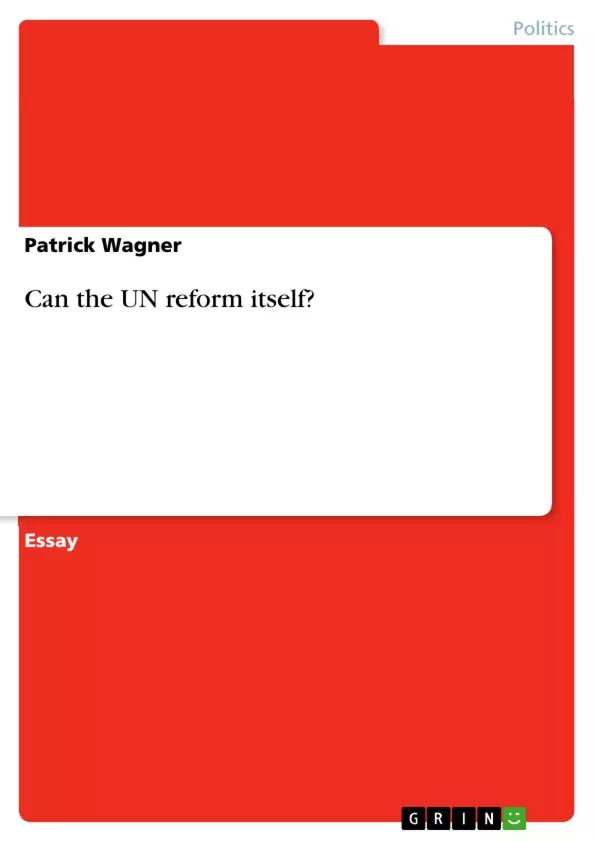The UN has seen several reforms since its foundation in 1945. A constantly changing political situation and new areas for UN intervention and help have for a long time made reforms necessary. “Reform of the United Nations has been under discussion for decades.” However, the need for reforms is now greater than ever. The end of the Cold War has marked the beginning of a new world order, and also the beginning of a new era for the UN. A whole range of new problems and issues have appeared on its agenda: environmental problems, gender issues, refugees and international terrorism to name but a few. In addition to these new and demanding tasks, the UN still has to deal with ordinary economical development, peacekeeping and all the rest of its traditional tasks. The UN simply cannot carry out these various tasks effectively if its financial and managerial structure is not fundamentally reformed.
Even if in the future a common view on the role of the UN can be found, will a global organisation like the UN not always need to be changed? Can there ever be a UN that meets all demands and is ‘finished’? Obviously, the world has changed a lot since the foundation of the UN in 1945, especially after the end of the Cold War, now making the need for reform very immediate. Yet, politics and international relations are not static and subject to change at any time. It seems to be inevitable, that the UN as a reflection of the world’s political situation will always be in need for adjustment and reform.
Inhaltsverzeichnis (Table of Contents)
- Can the UN reform itself?
- Introduction
- Reforms of the UN so far
- The period of decolonialisation
- Budgetary problems in the 1970s and 1980s
- The current situation
- Necessary reforms for the future
- Conclusion
Zielsetzung und Themenschwerpunkte (Objectives and Key Themes)
This essay investigates the capacity of the UN to reform itself, taking into account its historical development and current challenges. It analyzes the potential for the UN to adapt to the changing international landscape and examines the necessity of fundamental reforms.- The historical evolution of the UN and its reforms
- The impact of the Cold War's end on the UN's role and effectiveness
- The financial challenges facing the UN and the need for reform in its financial structure
- The role of member states in shaping the UN's future
- The need for the UN to redefine its role in the international system
Zusammenfassung der Kapitel (Chapter Summaries)
The essay begins by outlining the historical need for UN reforms, emphasizing the changing political landscape and the emergence of new challenges since its founding. It argues that the UN's effectiveness is hampered by its outdated financial and managerial structure. While acknowledging the organization's capacity for self-reform, the essay highlights the need for a fundamental redefinition of its role in the international system, a process that requires significant cooperation from member states. The essay then delves into the history of UN reforms, focusing on key milestones like the period of decolonialization in the 1950s and 1960s and the budgetary challenges of the 1970s and 1980s. It assesses the organization's ability to adapt to these challenges, while acknowledging the ongoing need for reform. Finally, the essay discusses the need for future reforms, emphasizing the importance of streamlining the UN's organizational structure and redefining its role within the international system. It examines proposals for reform of the Security Council and the need for regional strengthening of the UN.Schlüsselwörter (Keywords)
The essay explores the complex topic of UN reform, focusing on critical themes like the changing political landscape, the organization's effectiveness, financial challenges, the role of member states, and the need for a fundamental redefinition of the UN's role in the international system. It examines historical reforms and highlights the need for future changes to ensure the UN's relevance and effectiveness in the 21st century.Frequently Asked Questions about UN Reform
Why does the UN need to undergo reforms?
The world has changed significantly since 1945. New challenges like international terrorism, climate change, and refugees require a more modern financial and managerial structure to remain effective.
How did the end of the Cold War affect the UN?
The end of the Cold War marked a new world order, bringing a wide range of new problems to the UN agenda and making the need for fundamental organizational changes more immediate.
What are the main financial challenges for the UN?
The UN struggles with budgetary problems and an outdated financial structure that hinders its ability to carry out traditional tasks like peacekeeping and economic development effectively.
Can the UN reform itself?
While the UN has a history of self-reform (e.g., during decolonization), major changes require the cooperation and political will of its member states to redefine its global role.
What are the proposals for Security Council reform?
Proposals often focus on making the Council more representative of the modern world, including changing its membership and streamlining decision-making processes.
- Quote paper
- Patrick Wagner (Author), 2002, Can the UN reform itself?, Munich, GRIN Verlag, https://www.grin.com/document/18952



